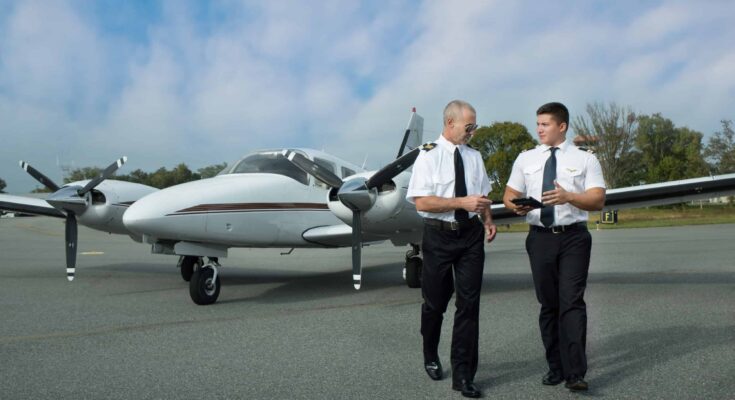Introduction: Navigating the Crossroads of Aviation Careers
The aviation industry, a dynamic and ever-evolving sector, offers a plethora of exciting career paths. For those with a passion for flight, two prominent avenues often emerge as primary considerations: direct pilot training and an aviation management degree. While both lead to rewarding careers within the industry, they cater to distinct skill sets, career aspirations, and offer vastly different daily experiences.
This comprehensive article will delve into the nuances of pilot training and aviation management degrees, providing an in-depth comparison to help aspiring aviation professionals make an informed decision. We will explore the curriculum, career opportunities, earning potential, time commitment, and the unique advantages and disadvantages of each path. By understanding these critical distinctions, you can effectively chart your course toward a fulfilling career in the skies, whether it’s at the controls of an aircraft or at the helm of aviation operations.
The Rigors of Pilot Training Curriculum
Pilot training is primarily focused on practical flying skills and the associated theoretical knowledge. The curriculum typically progresses through various licenses and ratings:
- Private Pilot License (PPL): This is the foundational license, allowing individuals to fly for recreational purposes. It covers basic aerodynamics, navigation, meteorology, aircraft systems, and flight maneuvers.
- Commercial Pilot License (CPL): Building upon the PPL, the CPL allows pilots to be compensated for their flying services. This involves more advanced flight maneuvers, instrument flying, and multi-engine aircraft training.
- Airline Transport Pilot License (ATPL): The highest level of pilot certification, the ATPL is required for pilots to act as captain or co-pilot on commercial airline flights. This involves extensive theoretical knowledge in areas like air law, operational procedures, performance, and flight planning, along with significant flight hours.
- Type Ratings: Specific training for a particular type of aircraft (e.g., Airbus A320, Boeing 737) is essential for commercial airline pilots.
- Flight Instructor Ratings: Many pilots, especially early in their careers, pursue instructor ratings to build flight hours and experience while teaching new students.
The training involves a significant amount of flight hours in various aircraft and simulators, coupled with ground school to cover theoretical aspects.
Career Opportunities for Pilots
Graduates of pilot training programs have a direct route to the cockpit. Common career paths include:
- Commercial Airline Pilot: Flying for major airlines, regional carriers, or cargo airlines, transporting passengers or goods. This is often the ultimate goal for many aspiring pilots.
- Charter Pilot: Operating private or corporate jets for individuals or businesses. This can offer more varied schedules and destinations.
- Flight Instructor (CFI): Teaching aspiring pilots and building flight hours. Many pilots start their careers as CFIs.
- Agricultural Pilot (Crop Duster): Flying specialized aircraft for agricultural spraying.
- Test Pilot: Flying experimental aircraft or newly manufactured planes to test their performance and safety.
- Military Pilot: Serving in the air force or naval aviation, flying military aircraft.
- Drone Pilot: While different in operation, the principles of aviation and regulations learned in pilot training can be beneficial for advanced drone operations.
Earning Potential and Job Outlook for Pilots
Pilot salaries can be highly lucrative, especially for experienced airline captains. Entry-level positions, such as First Officer, will naturally have lower salaries, but these can grow significantly with experience and seniority. The demand for qualified pilots is generally strong globally, driven by increasing air travel and pilot retirements. However, the industry can be susceptible to economic fluctuations.
Understanding Aviation Management Degrees: Leading from the Ground
An aviation management degree focuses on the business, operational, and administrative aspects of the aviation industry. It prepares individuals for leadership and managerial roles within airlines, airports, and related organizations.
Earning Potential and Job Outlook for Aviation Management Professionals
Salaries in aviation management can vary significantly based on the specific role, experience, and level of responsibility. While entry-level positions might have moderate salaries, managerial and executive roles can command competitive compensation. The job outlook for aviation management is generally stable, with growth tied to the overall expansion of the aviation industry and the increasing complexity of operations. New airport developments and technological advancements further contribute to demand for skilled professionals in this sector.
Key Differentiators: Pilot Training vs. Aviation Management
To help you decide, let’s break down the crucial differences between these two paths:
Time Commitment and Cost
Pilot training is typically a shorter, more intensive path to initial employment, but it can be very expensive. A Commercial Pilot License (CPL) in India can range from ₹25 lakhs to ₹40 lakhs, with an additional ₹10 lakhs to ₹20 lakhs for an ATPL. The total time commitment for a CPL can be around 18-24 months.
Aviation management degrees, particularly bachelor’s programs, generally take three to four years to complete, similar to other university degrees. The cost of an aviation management degree can vary widely depending on the institution, but it is often less than the total cost of pilot training, especially considering the extensive flight hours involved in the latter.
Skill Set and Aptitude
Pilot Training requires:
- Exceptional hand-eye coordination and spatial awareness: Crucial for controlling an aircraft.
- Strong decision-making skills under pressure: Pilots must make quick, accurate decisions in critical situations.
- Excellent communication skills: Clear and concise communication with air traffic control and crew is paramount.
- Attention to detail: Meticulous adherence to procedures and checklists is vital for safety.
- Problem-solving abilities: The capacity to analyze and resolve unexpected issues during flight.
- Physical and mental resilience: Long hours, irregular schedules, and high-stress situations demand fortitude.
Aviation Management Degrees emphasize:
- Leadership and teamwork: Managing diverse teams and departments.
- Analytical and critical thinking: Interpreting data, identifying trends, and solving complex operational problems.
- Business acumen: Understanding financial statements, marketing strategies, and operational efficiency.
- Communication and interpersonal skills: Effective communication with stakeholders, employees, and customers.
- Organizational and planning skills: Strategic planning, project management, and logistical coordination.
- Adaptability: Navigating a constantly evolving industry with new technologies and regulations.
Work-Life Balance and Lifestyle
Pilots often face irregular schedules, including weekends, holidays, and extended periods away from home due to layovers and international travel. While this offers the excitement of exploring new places, it can be demanding on personal life and relationships.
Aviation Management professionals generally have more predictable schedules, often working standard office hours. While some roles might require travel or on-call duties, the overall work-life balance tends to be more stable than that of a pilot.
Long-Term Career Growth and Flexibility
Pilot Training: While a direct path to the cockpit, career progression for pilots typically involves moving from First Officer to Captain, and then potentially to senior roles like Chief Pilot or fleet manager, which often require a blend of flying and administrative duties. Without a formal degree, transitioning to non-flying roles within the industry might be more challenging.
Aviation Management Degrees: Offer a wider range of career advancement opportunities across various departments within the aviation ecosystem. Graduates can specialize in areas like operations, marketing, finance, safety, or human resources, and climb the corporate ladder into executive positions. The transferable skills gained from a management degree also provide greater flexibility for careers outside of aviation if desired.

